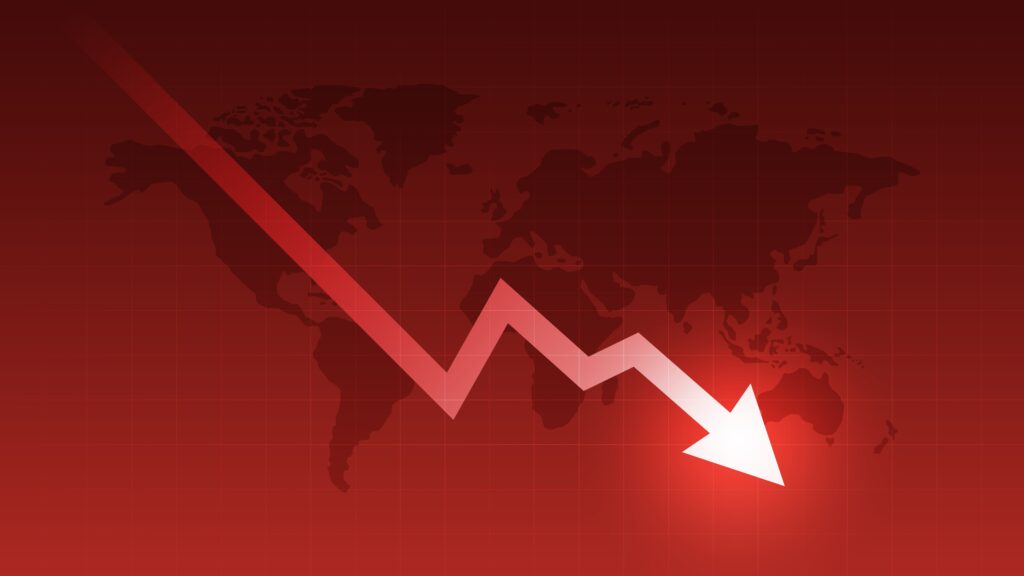The potential for volatility and rapid fluctuations in the stock market are cause for worry for investors. There are many factors involved in these kinds of changes, which is why it is so important to do your research and set clear goals before you invest. When you have a better understanding of the bigger picture in the world of investing, you can make better decisions and become financially resilient, even in a global market decline.
What leads to all stocks dropping?
Stock market sell-offs are driven by several factors. An overvalued market, interest rate hikes nationally and/or globally, poor earnings reports from major corporations, and a poor job market are a few.
It’s important to remember that stocks fluctuate. Some are more stable, and others quite volatile, depending on the type of stocks purchased, but looking at the stock market over time, we see a rise in value with approximately a 10% average return on investment each year, if you learn how to invest wisely.
What should you be putting your money toward for long-term financial wellness?
When it comes to long-term financial wellness, there isn’t a one-size-fits-all answer. It depends on your situation and risk tolerance. If you are learning how to start investing money, understanding your personal risk tolerance is your place to begin. You must feel comfortable and confident when you make investments. If you do not feel comfortable with an investment opportunity – DON’T DO IT!
If low-risk investment opportunities are more comfortable for you, think about:
-
- Government bonds. They have low interest rates but periodically pay interest to investors and are guaranteed by the federal government.
- Annuities. They are a financial vehicle that is backed by an insurance company, in which the investor makes a lump-sum payment or a series of payments, with the intention of receiving a guaranteed, fixed income stream in the future. CLICK HERE TO LEARN ABOUT THE DIFFERENT TYPES OF ANNUITIES. But make sure you understand the fee structure of any annuity you consider.
Mid-risk investments can include:
- Staple stocks are investments in companies that produce goods or sell services that are always in demand. Groceries, paper goods, make-up, or pet supplies are examples of things people will always need, regardless of what’s happening in the market.
- Utilities are also something people need, and as a bonus, utility stocks typically pay dividends, delivering an additional stream of income.
- Real estate is an investment that typically increases in value over time. People always need a place to live, so investing in multi-family housing or high-demand commercial property can offer good returns.
High-risk investments are speculative and are therefore unpredictable. Examples are:
- Land banking, which is where a private company gathers parcels of land, and/or abandoned or unlivable properties for future sale or development.
- Crypto assets are digital non-tangible assets that are created and traded. Cryptocurrencies and tokens are examples of crypto assets.
- Penny stocks are small company stocks that trade for less than one dollar. They are risky because the companies do not typically have a proven track record, and the stocks are not as regulated as other securities.
For all investors, regardless of risk tolerance, diversity in your portfolio and across asset categories (paper assets, real estate, intellectual property, businesses) is a must. You never want to have one point of success or failure. The more streams of income you have, the easier it will be to ride through the various ebbs and flows of the market, without having to rely on stock market predictions that may or may not be accurate.
What is the safest investment right now?
In my personal opinion, the safest investment is always an investment in yourself. Anything you can do to increase your personal value, knowledge, and skillset will help you be of greater service to others. This improves your marketability, which will open opportunities to increase your income.
Many people overlook their opportunities to create assets when they think about investing or investing in themselves. There are things that you know how to do that other people don’t, or ways you do things faster that can be a huge benefit to someone else. That is monetizable. You can turn that intellectual property into assets that other people can use to make their lives easier. Books, courses, and unique processes are great examples of intellectual property that can be turned into streams of income.
To be financially effective with your investments, I strongly suggest getting a financial advisor or working with a money mentor who has a proven track record, especially if you are a beginner investor. You will become successful faster if you don’t try to do it all on your own. Because investing is one of their areas of specialty, these money experts will have information, tools, and guidance to become financially resilient, even in a global market decline.
If you’d like a highly cost-effective way to get the financial information you need to become a successful investor, I invite you to join Let’s Talk Money. We meet monthly in this mentoring group to discuss what’s happening in the financial world; we explore possible opportunities for investors and businesses; and I share the things that are influencing my personal financial decisions.
With Let’s Talk Money, you will get insights to help you stay focused on tangible steps to steadily improve your financial situation. CLICK HERE TO LEARN MORE!
Recent Posts
Invisible money habits can drain your bank account without you even realizing it, which can keep you stuck in the cycle of living paycheck to paycheck. That’s why it’s so …
Read More
Will there be a recession? Depending on the source, some experts say yes, some say no, and others say it will be coming within the next two years. No matter …
Read More
The earlier in life you can start to develop your good money habits the richer your financial future will be to become a financially stable woman, here are 5 financial …
Read More





